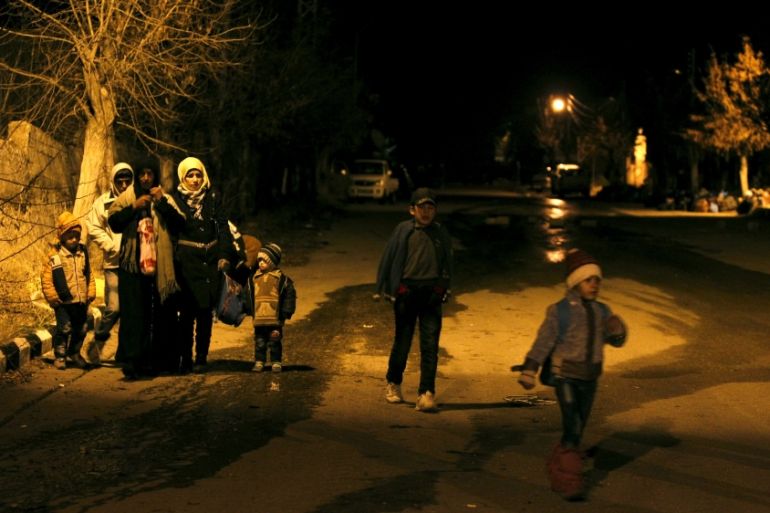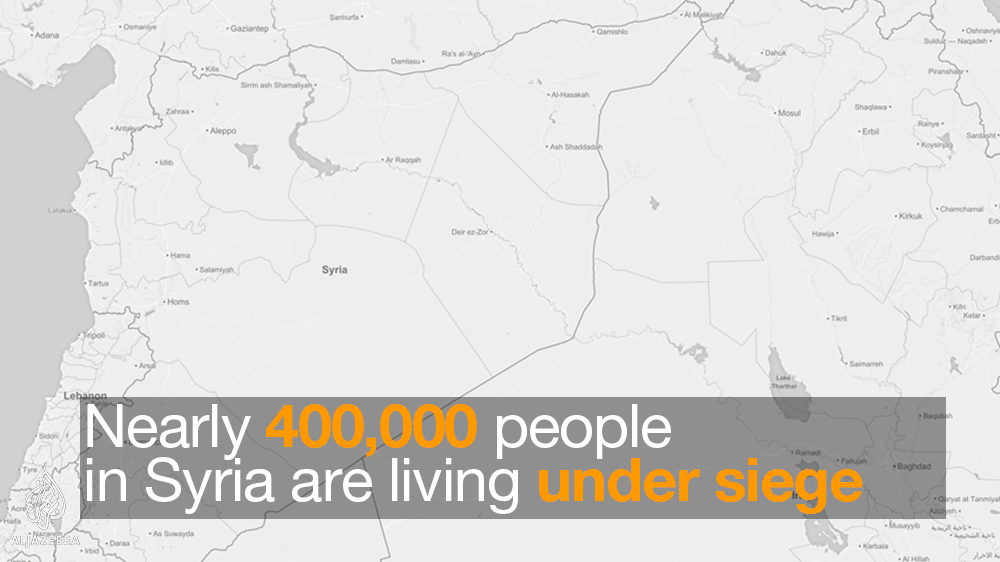UN urges sustained aid access to besieged Syrians
Plea comes as first delivery of food reaches residents of Madaya and two other starving towns cut off for months by war.

The UN humanitarian chief has called for the delivery of aid to three besieged towns in Syria to be the first of many and welcomed a Syrian statement that such deliveries should be repeated and sustained.
Stephen O’Brien said – after briefing the UN Security Council behind closed doors – that the arrival on Monday of convoys to help civilians in the three towns cut off for months by the war in Syria must not be “either one-off or exceptional”.
Keep reading
list of 4 items‘Mama we’re dying’: Only able to hear her kids in Gaza in their final days
Europe pledges to boost aid to Sudan on unwelcome war anniversary
Birth, death, escape: Three women’s struggle through Sudan’s war
The UN says 4.5 million Syrians are living in besieged or hard-to-reach areas and desperately need humanitarian aid, with civilians being prevented from leaving and aid workers blocked from bringing in food, medicine, fuel and other supplies.
|
|
| Aid reaches Madaya and other towns |
Reports of starvation and images of emaciated children have raised global concerns and underscored the urgency for new peace talks that the UN is hoping to host in Geneva, Switzerland, on January 25.
Aid convoys with food and other supplies reached three besieged locations – Madaya, near Damascus, where O’Brien said about 400 people need to be evacuated immediately to receive life-saving treatment for medical conditions, malnourishment and starvation – and the villages of Fouaa and Kefraya in northern Syria.
The aid operation, which is being facilitated by the UN, was agreed on last week.
O’Brien said efforts will be made to get ambulances to Madaya on Tuesday to evacuate the 400 people, of all ages, if safe passage can be assured.
It will take several days to distribute the aid in Madaya, Fouaa and Kefraya and the supplies are probably enough to last for a month, aid agencies said.
“It’s really heartbreaking to see the situation of the people,” said Pawel Krzysiek, a Red Cross spokesman who oversaw the distribution in Madaya.
READ MORE: Communities under siege in Syria
“A while ago, I was just approached by a little girl and her first question was, ‘Did you bring food?'”
Sajjad Malik, a representative of the UN High Commissioner for Refugees who took part in the delivery operation, described how grateful the people were.
“It’s cold and raining, but there is excitement because we are here with some food and blankets,” he said.
The operation marked a small, positive development in a bitter conflict now in its fifth year that has killed a quarter of a million people, displaced millions of others and left the country in ruins.
Rebels opposed to President Bashar al-Assad are in control of Madaya, a mountain town about 24km northwest of Damascus.

Government troops and fighters from the Lebanese group Hezbollah have the town surrounded.
Opposition activists and aid groups have reported several deaths from starvation in recent weeks.
However, Bashar Jaafari, Syria’s UN ambassador, has denied that anyone is starving in Madaya and blamed Arab television especially “for fabricating these allegations and lies”.
Speaking at the UN headquarters on Monday, he blamed “armed terrorist groups” for stealing humanitarian aid and reselling it at prohibitive prices.
“The Syrian government is not, and will not be, exerting any policy of starvation against its own people,” Jaafari said.
Nevertheless, O’Brien, the UN humanitarian chief, said all the evidence that the UN has shown there has been very severe malnourishment, severe food shortages, and reports of people “who are either starving or indeed have starved and died”.
READ MORE: Snow and cold weather grip war-torn Syria
Madaya has attracted particular attention in recent days because of reports of deaths and images in social media of severely malnourished residents.
Some Assad supporters have said that the photos were faked, and others alleged the rebels were withholding food from residents.
The aid deliveries come as Russia, the US and several Arab countries are promoting the forthcoming Geneva talks between the Assad government and the opposition.
![Aid convoys with food and other supplies reached the besieged towns of Madaya, Kefraya and Fouaa on Monday [AP]]](/wp-content/uploads/2016/01/2f68946a3b1a438cab1086d6a5e8814b_18.jpeg)
In an interview published on Tuesday, the Russian president said it would be too early to speak about granting political asylum to Assad, who is seen as a highly divisive figure.
Vladimir Putin told the German newspaper Bild that Russia was advocating constitutional reform in Syria and, if the next election was democratic, “Assad won’t have to go anywhere, no matter if he is elected president or not.”
While Putin refused to speculate on a possible Russian role in helping to remove Assad, he indicated that it would not be too difficult for his country to do.
“We granted asylum to Snowden,” he said referring to the American whistleblower Edward Snowden.
“That was more difficult than [it would be] to shelter Assad.”
Russia began carrying out air strikes on alleged positions of the Islamic State of Iraq and the Levant (ISIL) group in September in support of Assad’s army which critics say are aimed against Assad’s opponents.
|
|